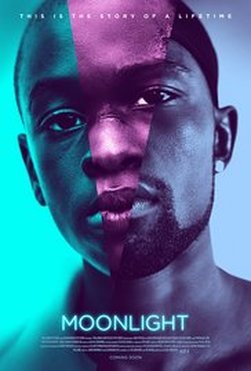|
Before actually seeing the film, social media and my friend group were already abuzz with “Moonlight” praises. I was told this film brought to light a narrative rarely explored in mainstream cinema, the humanity and holistic development of Black men, as told by Black men, without interruption. It was because of the amazing reviews and the Oscar nomination and win that I planned to witness this coming-of-age story about men that had nothing to do with me. I planned to be an observer, appreciate the cinematography, the writing, the acting. I was sure my partner would have much more to say after the film, as a Black man, than I. However, what I did not plan on was “Moonlight” speaking to me personally. I did not prepare to observe moments I experienced, yet never uttered to anyone, smeared on the screen dripping until the credits rolled. It’s simple: “Moonlight” is poetry. It is poetry in the way a poem gives words to the unspoken moment. “Moonlight” crafts the unspoken moment of growth and self-discovery and sits it next to sound and image and starts to play, then mirrors it back to you in your ear.
Sound. The silence in this film defined the pivotal, not unlike how silence works in our own lives. It was uncomfortable. I wanted, craved, silently squirmed in my partner’s arms waiting for dialogue in certain moments–but nothing came. Silence. It immediately made me reflect on how silence and sound accentuated life lessons and relationships. In seventh grade, when being ran from because I had two mothers and my friends were going to catch the “gay”, I just watched them and said nothing. Their laughs faded, their footsteps became mute. That is when I realized that friendship and trust were things I still had to grow towards, and I didn’t know how. When I was called a nigger in the third grade after school by a White boy, I said nothing. I just looked at him and realized race was not something that could burn off like the Los Angeles fog. I was a Black girl, and according to this boy, a nigger. Having a secret on my tongue and letting it twirl around in my mouth while my mother waits. These moments defined curves, ebbs, and flow in my growth. Moonlight’s freedom with sound and the deliberate elimination of sound reminded me how important those lessons, epiphanies, trials were. I was not a Black man appreciating a Black man story. I was a Black woman witnessing a human story, as told through the journey of one Black man. Although tears did flow, I was not sad at the conclusion of the film, in the same way a poem might remind one of heartbreak and beauty simultaneously. Chiron’s story is a window into a childhood reality all too common to families of color, and families surviving in poverty. However, what Barry Jenkins, director and screenwriter, was able to portray was the hope, the light, and the truth that guide us, as people, as we grow and navigate these trials. Chiron found his truth and his safety in the ocean, just like me. It’s at the shore, with my feet being kissed by the waves; the sound of them crashing; knowing they will always crash forever, whether I am at the shore’s edge or not, whether I am afraid or not; wherever I am the ocean has always been my truth. The main character always had the ocean to bring him back to his truth. What’s more, is that we never get an answer for what his truth is, be it his sexuality, his aspirations… Again, “Moonlight” was asking me to reflect on where my truth has revealed itself throughout my life. My truth has shown up at Prospect Park, Central Park, on the Portland Coast, Venice Beach, in the first tulip of the season in Bed-Stuy, Brooklyn; my truth has always shown up and brought me back, no matter how far I strayed. The tears appeared and fell down my cheeks on the way home out of gratitude because, much like Chiron’s experience in “Moonlight”, I get to grow in silence and in sound and in truth. Chiron was able to find his truth and it gave me hope that I can too, even when I forget it. As a young Black woman in her 20’s who’s watching the country lose its truth and suffers in silence, I needed a reminder that truth always wins, however it reveals itself, be it through the ocean turning over on itself to inspire a boy to become his own man, or a poet putting pen to paper, or “Moonlight” being recognized for the poem and epiphany that it is. Truth always wins and so did “Moonlight”.
0 Comments
Leave a Reply. |
AuthorTayllor Johnson currently resides in New York City where she has begun her journey into Poet. Passion. Period. In between those learning moments, she sometimes has just enough time to jot a few lines... Archives
March 2021
Categories
All
|
